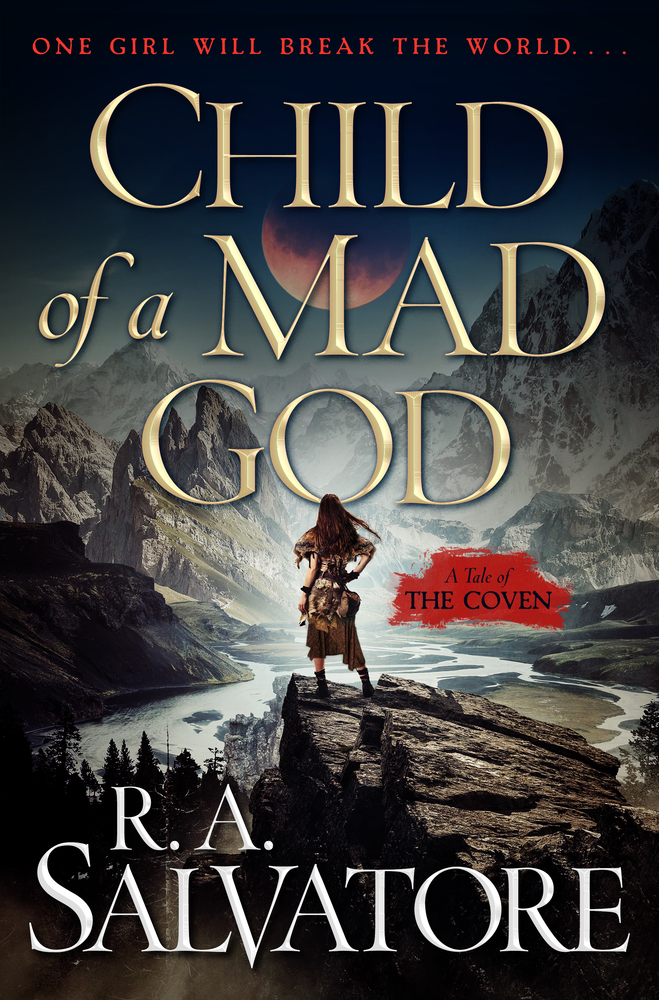With Child of a Mad God, R.A. Salvatore Begins a New Dark Fantasy Series
With Child of a Mad God, R.A. Salvatore has struck the perfect balance between something old and something new.
R.A. Salvatore has been writing fantasy for three decades and, in that time, has certainly made his mark on the genre. When anyone has been at their job that long, there is an understandable tendency to settle, to repeat, to fall back on familiar patterns, but Salvatore’s latest — Child of a Mad God — is proof that he is still willing to take chances when it comes to his fantasy work.
Child of a Mad God has many of the elements readers have come to expect from Salvatore, detailed action scenes and fantastic world-building, but there is also a grittiness and ambition to deconstruct genre gender tropes, that is pushing the limits of what Salvatore has done before.

Child of a Mad God takes place within the brutal northern Wilderlands of Corona, a land previously explored in Salvatore’s DemonWars Saga. Though reading these other Corona-set books will give you additional insight, Child of a Mad God is not a continuation of these stories. It takes place concurrently to the events of the DemonWars Sagain a completely different part of this land, and is the start to The Coven Series.
Child of a Mad God has two central protagonists: Talmadge is a young frontiersman who fled his home after a plague ravaged his community and now spends his time as a trader in the shadow of a great mountain. He flits between the seven towns that make up the region, never staying in one place for very long, desperate to avoid the kinds of connections that inform his unresolved trauma.
Aoleyn is a girl of the Usgar Tribe who, after losing her parents, must learn how to survive within a culture where rape, slavery, and other brutal, patriarchal forms of oppression are normal. The Usgar live on the aforementioned great mountain, and survive by attacking the seven towns that Talmadge frequents. The people of these towns fear the Usgar, and see them as almost god-like beings because of their magic. Aoleyn is one of the tribe’s women who can wield the Song of Usgar, a form of magic.
Child of a Mad God is meant as a standalone, and it truly is. It helps that Salvatore is a skilled worldbuilder. The setting and cultures Salvatore explores in this book, the region that lives on around the great mountain Fireach Speuer, are immersive. You don’t need any external context; you have all of the description you need within the pages of this book.
Aeolyn’s arc is particularly strong and is obviously Salvatore’s noble attempt to address and critique the sexist framework from which much of classic fantasy literature gets its structure. However, although Salvatore is using the book’s patriarchal cultures to make a point, it may be too much for some readers. Salvatore may be trying to subvert some of the worst trends and tropes in fantasy literature through his exploration of the extremely misogynistic Usgar society and the journey Aoleyn goes through over the course of the book, but it makes for a difficult read if you are at all sensitive to these issues. There is a particularly horrific rape at one point that may be a dealbreaker for some readers, so be warned going in.
Salvatore is known for his detailed fight scenes, and the skill is on display in Child of a Mad God—though, this is a book that takes it time getting to its climactic third act. In the mean time, there is plenty of fantasy worldbuilding to delve into, including the fossa, a demon that hunts during the blood moon, and the magic of the gemstones, which are treated slightly differently here than in Salvatore’s other Corona-set books.
For readers who are fans of gritty fantasy (a la A Song of Ice and Fire), R.A. Salvatore, or books working to recognize the misogynist subtext of some of our culture’s favorite genre books, Child of a Mad God is a story well worth diving into. From his recurring Drizzt Do’Urden character to Salvatore’s controversial choices in the Vector Prime book of the expanded Star Wars universe, Salvatore has made a name for himself as an author who isn’t afraid to go fantastically dark and to challenge what has come before. Child of a Mad God continues that legacy.
